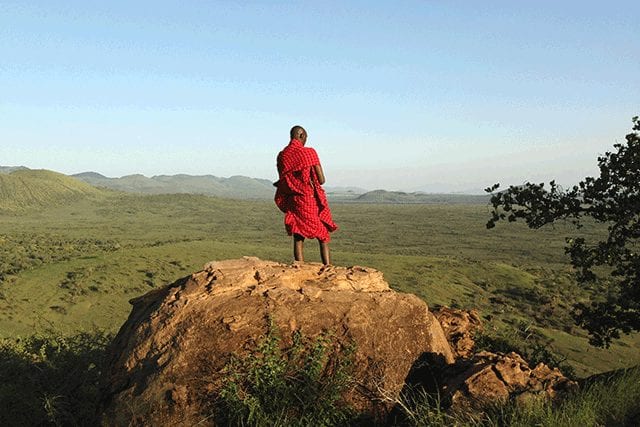Growing up in Columbia, Maryland, actor Edward Norton was surrounded and deeply ingratiated in the world around him. He went on countless camping and river rafting trips with his father—himself a top conservation advocate working for the Wilderness Society and founding the Grand Canyon Trust, among other ventures—from which “the roots of my love of the natural world and the passion to protect all stem from,” he says. His father’s eco-conscious pedigree encouraged Norton to look beyond Hollywood and focus on improving the planet.
Norton visited Campi ya Kanzi in Kenya with his brother and sister in 1999, and was struck by cofounder Luca Belpietro’s “deep understanding of the need to make biodiversity and natural resources an alternative income portfolio for communities like the Maasai,” he explains. He got his father to help advise Belpietro and his wife Antonella Bonomi, and partnered with them to help grow the Maasai Wilderness Conservation Trust (he signed on as the U.S. board president in 2007), which protects the land and biodiversity of Africa while simultaneously supporting the Maasai community. “Belpietro built the most impressive community conservation organization in East Africa,” he explains. “He was not the average commercial tourism operator making a few gestures at conservation. He was a conservationist using tourism as strategy.” Most safari operations are “quite frankly just greenwashing” and superficial, he says, and don’t meet true sustainability standards. Yet at Campi ya Kanzi, sustainability takes precedent: The camp gets its water from rain cropping, operates on solar power with hot water solar boilers, and more than 95 percent of the staff is made up of local Maasai. In fact, he says, head guide Samson Parashina and trust president and chairman “is the kind of community leader who will change the world if we can develop the talents of more young people like him in communities that live within critical ecosystems.”

Norton has partnered with the Maasai Wilderness Conservation Trust to protect Africa’s biodiversity and natural resources.
In addition to his work with the Maasai, Norton was appointed United Nations Goodwill Ambassador for Biodiversity in 2010, and that same year founded CrowdRise, a grassroots platform that raises funds for charities and nonprofits on its way to reaching the $1 billion donation mark after merging with GoFundMe. It’s a natural continuation of his philanthropic endeavors, which includes raising more than $60 million on his combined platforms for Hurricane Harvey victims.
But, he warns, “arguing solely for the spiritual value of nature is not going to be effective against the needs of what will soon be 10 billion people,” most of whom are poor and without necessary resources. “We must make the case for healthy ecosystems and biodiversity as the foundation of our economic future,” instead of growing an economy that supports and thrives off its abuse and forthcoming demise. Although he says the current U.S. administration is “pursuing the most vindictively regressive environmental policy of any major economic nation on the planet,” he remains optimistic. Their time in power is limited, he points out, and the price-efficient clean-tech shift can’t be stopped, despite “all the corrupt subsidies baked into the oil and gas industries.”
Norton also supports Earthjustice, a nonprofit dedicated to environmental law, and the Conservation Lands Foundation (led by Norton’s father), and goes to the Equator Prize Ceremony every year, where local communities are celebrated for their work and efforts. Still, one of the greatest lessons he’s learned throughout his journey comes directly from his father: “He always says, ‘Keep having fun in the last best places.’ I agree. These are dire times for the planet. But you have to be happy to get to do this work, and you have to do more than fight for the world. You have to travel and get out and see it so you stay inspired.”


